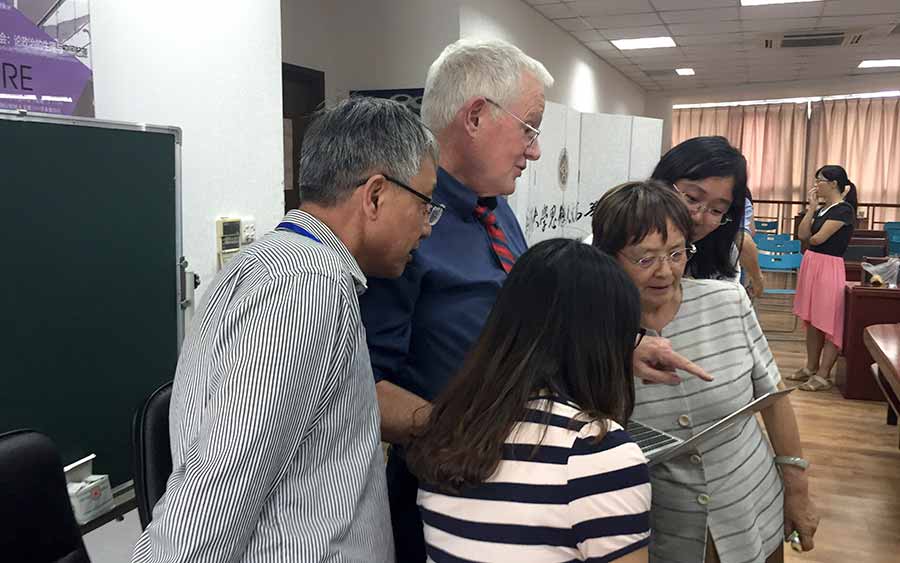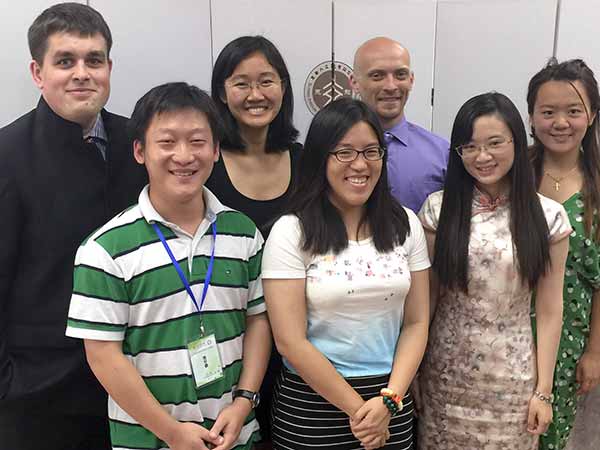
By:
- Cynthia Dillon
Published Date
By:
- Cynthia Dillon
Share This:
UC San Diego History Students Seize Rare Opportunity to View Chinese Records

Prof. Paul Pickowicz with students and faculty from Shanghai
The UC San Diego Department of History has forward-thinking graduate students. Presented with the opportunity to conduct research on a massive collection of rare Chinese archives, 12 pre-dissertation graduate students embraced the challenge, mixing history and technology to tackle a project called, “Everyday Life in Revolutionary China.” The students’ unprecedented research led to a new five-year collaboration between UC San Diego and East China Normal University in Shanghai, with the next round of research presentations scheduled for June 2016 in San Diego.
According to Paul Pickowicz, a modern China history scholar at UC San Diego, of paramount importance were the ethical and moral issues surrounding historical files that contained information about the lives of ordinary people between 1949 and 1989—up to the time of the Tiananmen Square Massacre.
“Our students pioneered a system that takes into account the many ethical issues surrounding people’s personal, private information,” noted Pickowicz, who was asked by librarians at Stanford University, curators of the files and with whom he has a long research relationship, to take advantage of this unique opportunity.
The research process involved UC San Diego Division of Arts and Humanities students visiting Stanford in January and February 2015 before presenting their research findings first at a conference at UC San Diego in June 2015 and then at East China Normal University in China in September 2015. At Stanford, the students developed a protocol whereby they used cell phones, iPads, iPhones and laptops to copy and upload massive holdings of hand-written and printed material between the hours of 9 a.m. and 11 p.m. for five consecutive days during the course of each trip. They also devised a tracking system for the stacks of boxed papers so as not to duplicate their colleagues’ digitizing efforts. At the end of the allotted access time each day, the students uploaded the data to Cloud storage curated by the Stanford librarians and accessible only by password to students, who signed pledges not to circulate the restricted log-ins or the digitized data beyond the research team.
Pickowicz explained the uniqueness of the project: “Historical records quite often reflect the lives of society’s elites,” he said. “But what’s life like for people on the ground? These files allowed us to get at that type of precious information.”

The UC San Diego student delegation in Shanghai
For example, one of the student researchers worked on a paper about the 1950s when the revolutionary government in China was a natalist regime, only to discover ample evidence of popular access to unofficial information about birth control.
During the spring quarter, the students crunched the data, wrote their papers and presented them at UC San Diego to visiting Chinese scholars and faculty from UC San Diego, UC Irvine and UC Riverside. Pickowicz said that the students’ papers were highly compelling to his Chinese colleagues. Recognizing these cutting-edge research accomplishments and the difficulty of writing about China’s recent history, the Shanghai colleagues invited the UC San Diego students to restage their presentations to an academic audience in China and offered to pay all expenses there.
To raise the funds needed to cover student airfare expenses overseas, Pickowicz tapped numerous pockets of on- and off-campus support he has cultivated over the years.
Ultimately, eight UC San Diego students presented research findings at East China Normal University to an audience that included such leading historians in China as Yang Kuisong and Cao Shuji. Eight Chinese graduate students from Shanghai collaborated with the UC San Diego students by presenting their own research papers.
Pickowicz said that the students from UC San Diego and Shanghai were united in their efforts and worked well together.
“It was a sign of respect for our students to have esteemed Chinese professors read and comment on their papers,” noted Pickowicz.
The story of the files finding a research home is compelling. Pickowicz explained that China has been on an economic upswing since the 1990s. With more money in hand, many work units began to tear down dilapidated Stalin-era buildings in which the files were stored. Many new local leaders were not interested in files about the country’s past, so mountains of archival material were taken to paper recyclers. But instead of destroying the papers, many recyclers resold the rare materials to brokers who offered them for sale to individual scholars in China and to institutional bulk purchasers. Word of the availability of unusual files of this type eventually made its way to Stanford, which became a key institutional buyer and whose librarians reached out to Pickowicz and offered his Ph.D. students an extremely rare research opportunity.
Pickowicz noted that previous classes of graduate students were offered the same research opportunity, but were preoccupied with other research projects. It was not until the 2014 – 15 academic year that the current cohort of graduate students took up the challenge and saw the opportunity to publish this innovative research in ways that will support eventual job applications and career placement.
“I pitched the intrinsic value of the project; this group bought it because it made sense,“ said Pickowicz. “I was delighted by the whole thing. No one knew what they’d find.”
Korea-area specialist and graduate-student teaching assistant in history, Inga Diederich, concurred: “Our hard work, and some luck, paid off. Everyone produced something they could use in the future.”
The next phase of the research collaboration between the two university programs will be led on campus next June by Pickowicz’ Department of History colleague Karl Gerth, a world renowned specialist on modern Chinese history.
Share This:
You May Also Like
Stay in the Know
Keep up with all the latest from UC San Diego. Subscribe to the newsletter today.


